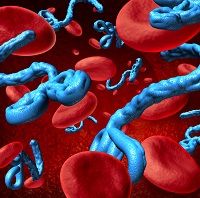Article
Promising Results on Ebola Antiviral
Author(s):
The US Army Medical Research Institute of Infectious Diseases reports promising preclinical results on an antiviral for Ebola. In findings presented at ID Week 2015 in San Diego, CA, Travis Warren, PhD, a principal investigator said a collaboration with Gilead on a compound known as GS-5734 completely protected rhesus monkeys after they were infected with the virus.

The US Army Medical Research Institute of Infectious Diseases reports promising preclinical results on an antiviral for Ebola.
In findings presented at ID Week 2015 in San Diego, CA, Travis Warren, PhD, a principal investigator said a collaboration with Gilead on a compound known as GS-5734 completely protected rhesus monkeys.
In cell culture studies the molecule also worked against Lassa virus, Middle East Respiratory Syndrome, Marburg virus and multiple variants of Ebola, USAMRIID announced.
In the animal studies, treatment was initiated three days after the monkeys had been infected with Ebola. They showed 100 % survival, a substantial reduction in viral load, a marked decrease in signs of the disease including internal bleeding and tissue damage.
The compound is meant to block the virus’s ability to replicate. The research team said the compound can be easily prepared and made on a large scale.
Gilead is currently conducting phase 1 studies on healthy human volunteers.
Funding came from the US Department of Defense.
2 Commerce Drive
Cranbury, NJ 08512
All rights reserved.





